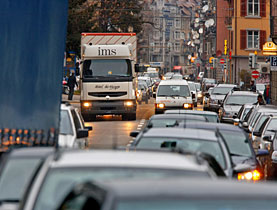Drivers speed towards diesel fuel

Around a third of all new cars in Switzerland now run on diesel and demand for the fuel is increasing, according to the latest figures.
Industry experts say the move towards diesel – which is still more expensive than petrol in Switzerland – is a confirmed trend. But concerns have been raised over its green credentials.
Statistics released by the Swiss Oil Association earlier this week showed that sales of petrol fell by one per cent in 2007 from 2006 whereas those of diesel increased by 7.3 per cent.
One of the main reasons given for this was the rising popularity of diesel cars. In all, 32.5 per cent of new cars bought in 2007 were diesel.
In 1990 only 2.6 per cent of new cars used the fuel and by 2000 this had risen to 9.2 per cent. The percentage of diesel drivers among the population has more than tripled to 13.5 per cent over the past 20 years.
“People are buying diesel engines more than before because they are more economical than petrol-driven ones. These engines are better and not as noisy as they used to be,” Erich Schwizer from the motoring organisation the Touring Club of Switzerland (TCS) told swissinfo.
Strong advertising by the car market has focused on the fuel efficiency aspect. “Many people value low fuel consumption although the diesel price at the petrol station is at the moment around SFr0.16 ($0.15) per litre higher than petrol,” observed Schwizer.
Higher diesel prices may well be why Switzerland is still not as diesel-friendly as its neighbours, where the fuel is cheaper.
According to the Swiss Association of Car Importers, around half of new cars in the European Union run on diesel. But Schwizer does not believe the situation in Switzerland is likely to change for now.
“In the long term, it depends on how petrol engines develop, whether diesel engines become even more economical, the evolution of fuel prices and vehicle taxes,” he said.
Environmental concerns
The drive towards diesel provokes mixed feelings among green groups. “Compared with petrol cars, diesel cars emit less carbon dioxide so from this point of view they are better environmentally than petrol ones,” said Noëlle Petitdemange, spokeswoman for the non-governmental Transport and Environment Association.
“In terms of fine particles and nitrogen oxides (NOx) the result is a lot more negative for diesels. They emit 1,000 times more fine particles than petrol cars and up to five times more NOx,” she told swissinfo.
The association and TCS therefore recommend buying a diesel car with a filter. The device is not obligatory for cars in Switzerland, a situation which environmentalists want to change.
But the motor industry has reacted – around 80 per cent of all new diesel cars have filters.
NOx problem
Smog-producing nitrogen oxides, which are harmful to the ozone layer and to human beings, still remain a problem.
In fact, particle filters produce higher quantities of the more dangerous gas nitrogen dioxide than vehicles without the devices.
Martin Weilenmann, from the Swiss Federal Laboratories for Materials Testing and Research (EMPA), says this is of particular concern in traffic-heavy towns and cities.
“That’s why diesel cars are optimal for long distance travel. For urban traffic, petrol or petrol hybrids or natural gas vehicles are more optimal,” Weilenmann, who specialises in road vehicle emissions, told swissinfo.
Only a few car manufacturers, such as Toyota and Mercedes, offer a De-NOx system to reduce NOx emissions. Other solutions are coming. But there is a catch.
“All these solutions show an increase in fuel consumption, so an increase in CO2. For customers the fact that there is both a particle filter and a De-NOx system means that vehicles will be more costly and the CO2 benefit will not be as big as it was before,” he said.
swissinfo, Isobel Leybold-Johnson
According to the Federal Environment Office, under similar driving conditions, Euro 4 (EU exhaust emissions) diesel engines consume 20-30% less fuel (litres per 100 km) than petrol engines meeting the Euro 4 standards. Emissions of CO2 are 10-15% lower.
But diesel engines without particle traps pollute the atmosphere: emitting up to 1,000 times more carcinogenic fine particles than a conventional petrol engine and around 100 times more than a direct-injection petrol engine.
Cars with diesel engines of this type produce on average 5-8 times more nitrogen oxides – a cause of summer smog – than petrol-driven cars.
New EU standards (known as Euro 5 and 6) will apply from September 2009, setting tighter emission limits of particles and of nitrogen oxides for new cars and vans sold in the EU market. This makes the introduction of particle filters for diesel cars obligatory.
Despite the popularity of diesel engines, their environmental impact leaves plenty of room for improvement according to the Transport and Environment Association.
It’s latest ranking of car cleanliness puts no diesel vehicles in the top ten, which is dominated by two hybrid cars, followed by three others powered by natural gas. There is one other natural gas vehicle in the top ten.
Four other cars in the ranking have standard petrol engines, but whose engine capapcity is only one litre. Three of them are also basically the same vehicle, although built by different manufacturers.

In compliance with the JTI standards
More: SWI swissinfo.ch certified by the Journalism Trust Initiative











You can find an overview of ongoing debates with our journalists here . Please join us!
If you want to start a conversation about a topic raised in this article or want to report factual errors, email us at english@swissinfo.ch.